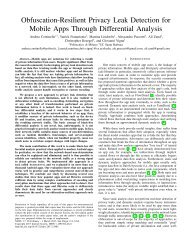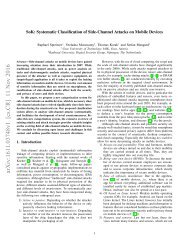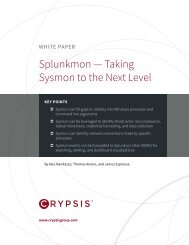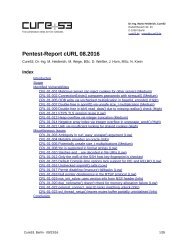You also want an ePaper? Increase the reach of your titles
YUMPU automatically turns print PDFs into web optimized ePapers that Google loves.
eing called again, but <str<strong>on</strong>g>the</str<strong>on</strong>g> sec<strong>on</strong>d call will be given <str<strong>on</strong>g>the</str<strong>on</strong>g> vtable specified at <str<strong>on</strong>g>of</str<strong>on</strong>g>fset 0x08. This call<br />
kicks <str<strong>on</strong>g>of</str<strong>on</strong>g>f a series <str<strong>on</strong>g>of</str<strong>on</strong>g> subsequent calls that ultimately leads to a call to _copyin that replaces <str<strong>on</strong>g>the</str<strong>on</strong>g><br />
getattr handlers for <str<strong>on</strong>g>the</str<strong>on</strong>g> real-time and battery clocks, as described in Establishing<br />
Read/Write/Execute Primitives <strong>on</strong> Previously Rooted Devices.<br />
Following <str<strong>on</strong>g>the</str<strong>on</strong>g> executi<strong>on</strong> <str<strong>on</strong>g>of</str<strong>on</strong>g> <str<strong>on</strong>g>the</str<strong>on</strong>g> exploit, and if <str<strong>on</strong>g>the</str<strong>on</strong>g> victim’s ph<strong>on</strong>e is an “iPh<strong>on</strong>e4,1” model, <str<strong>on</strong>g>the</str<strong>on</strong>g><br />
global variable c<strong>on</strong>trolling <str<strong>on</strong>g>the</str<strong>on</strong>g> 1000 threads generated previously is set to -1 in order to<br />
terminate <str<strong>on</strong>g>the</str<strong>on</strong>g> threads.<br />
To verify that <str<strong>on</strong>g>the</str<strong>on</strong>g> battery clock’s getattr handler is working as a kernel memory address<br />
reader, clock_get_attributes is called with <str<strong>on</strong>g>the</str<strong>on</strong>g> read locati<strong>on</strong> specified as <str<strong>on</strong>g>the</str<strong>on</strong>g> base<br />
address for <str<strong>on</strong>g>the</str<strong>on</strong>g> kernel. If <str<strong>on</strong>g>the</str<strong>on</strong>g> result from clock_get_attributes is not <str<strong>on</strong>g>the</str<strong>on</strong>g> magic value <str<strong>on</strong>g>of</str<strong>on</strong>g><br />
0xFEEDFACE, <str<strong>on</strong>g>the</str<strong>on</strong>g> attempt is made <strong>on</strong>ce more. A sec<strong>on</strong>d failure results in <str<strong>on</strong>g>the</str<strong>on</strong>g> assert callback<br />
being called and 32Stage2 terminating.<br />
Establishing Kernel Read/Write Primitives (64-Bit)<br />
The same underlying vulnerability is exploited in <str<strong>on</strong>g>the</str<strong>on</strong>g> 64-bit versi<strong>on</strong> <str<strong>on</strong>g>of</str<strong>on</strong>g> Stage 2. In principle, <str<strong>on</strong>g>the</str<strong>on</strong>g><br />
exploit is structured in a very similar way. The primary difference is that <str<strong>on</strong>g>the</str<strong>on</strong>g> ultimate execute<br />
primitive is established by writing to <str<strong>on</strong>g>the</str<strong>on</strong>g> net.inet.ip.dummynet.extract_heap sysctl<br />
handler. The OSSerializer::serialize is used in a similar way as within 32Stage2.<br />
Arbitrary code executi<strong>on</strong> (through <str<strong>on</strong>g>the</str<strong>on</strong>g> executi<strong>on</strong> <str<strong>on</strong>g>of</str<strong>on</strong>g> arbitrary ROP chains) is <str<strong>on</strong>g>the</str<strong>on</strong>g>n achieved using<br />
<str<strong>on</strong>g>the</str<strong>on</strong>g> same mechanism described in Establishing Kernel Execute Primitive (32-Bit).<br />
Establishing a Kernel Execute Primitive (32-Bit)<br />
As explained previously in Installing Kernel Access Handlers <strong>on</strong> Rooted Devices, <str<strong>on</strong>g>the</str<strong>on</strong>g> real-time<br />
clock’s getattr handler points to OSSerializer::serialize, which allows <str<strong>on</strong>g>the</str<strong>on</strong>g> caller <str<strong>on</strong>g>of</str<strong>on</strong>g><br />
clock_get_attributes to pass a specially crafted structure to<br />
OSSerializer::serialize in order to execute instructi<strong>on</strong>s within kernel space. By virtue <str<strong>on</strong>g>of</str<strong>on</strong>g><br />
executing within kernel space, <str<strong>on</strong>g>the</str<strong>on</strong>g> userland 32Stage2 process must have a way <str<strong>on</strong>g>of</str<strong>on</strong>g> transferring<br />
data to <str<strong>on</strong>g>the</str<strong>on</strong>g> kernel address space in a reliable manner. 32Stage2 uses a clever quirk <str<strong>on</strong>g>of</str<strong>on</strong>g> <str<strong>on</strong>g>the</str<strong>on</strong>g><br />
pipe-created pipe set to accomplish this task.<br />
After establishing <str<strong>on</strong>g>the</str<strong>on</strong>g> battery clock’s new getattr handler as _bufattr_cpx, 32Stage2 has<br />
a reliable method for reading DWORDs from <str<strong>on</strong>g>the</str<strong>on</strong>g> kernel address space into userland. 32Stage2<br />
uses this functi<strong>on</strong>ality to find <str<strong>on</strong>g>the</str<strong>on</strong>g> addrperm value stored within <str<strong>on</strong>g>the</str<strong>on</strong>g> kernel. addrperm defines<br />
<str<strong>on</strong>g>the</str<strong>on</strong>g> <str<strong>on</strong>g>of</str<strong>on</strong>g>fset applied to <str<strong>on</strong>g>the</str<strong>on</strong>g> address from <str<strong>on</strong>g>the</str<strong>on</strong>g> kernel when passed to userland in order to obfuscate<br />
<str<strong>on</strong>g>the</str<strong>on</strong>g> true locati<strong>on</strong> <str<strong>on</strong>g>of</str<strong>on</strong>g> <str<strong>on</strong>g>the</str<strong>on</strong>g> data in <str<strong>on</strong>g>the</str<strong>on</strong>g> kernel. By obtaining this value, it is possible to deobfuscate<br />
kernel addresses back to <str<strong>on</strong>g>the</str<strong>on</strong>g>ir real address values. 32Stage2 calls fstat <strong>on</strong> <str<strong>on</strong>g>the</str<strong>on</strong>g> read pipe<br />
from <str<strong>on</strong>g>the</str<strong>on</strong>g> generated pipe set and <str<strong>on</strong>g>the</str<strong>on</strong>g>n calculates <str<strong>on</strong>g>the</str<strong>on</strong>g> difference between <str<strong>on</strong>g>the</str<strong>on</strong>g> locati<strong>on</strong> <str<strong>on</strong>g>of</str<strong>on</strong>g> <str<strong>on</strong>g>the</str<strong>on</strong>g> stat<br />
Page 30
















